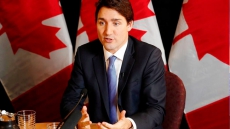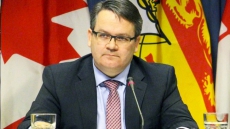WINNIPEG — An internal federal government report says almost half the First Nations across Canada have "little to no fire protection" and rely too heavily on poorly trained volunteer firefighters who can't do the job.
The 2011 report examining insurance coverage for First Nations communities, obtained by The Canadian Press through Access to Information legislation, found only 56 per cent of First Nation sites across Canada have adequate fire protection — most because they depend on a neighbouring municipality.
British Columbia and Manitoba had the highest percentage of First Nation sites with little to no fire protection while First Nations in Atlantic Canada had the most sites with adequate service.
"The number of fire-related deaths in First Nations is also a major concern," the consultant's report said. "The fire death rates in First Nations are substantially higher than those off reserve."
The report found that fire incidence rates for First Nations are 2.4 times higher than for the rest of Canada. First Nations residents are also 10 times more likely to die in a house fire.
The victims are often young children.
A two-year-old boy and an 18-month-old girl were carried by their father from a burning home this year on the Makwa Sahgaiehcan reserve in Saskatchewan. They were pronounced dead at the scene. The fire department from a neighbouring municipality didn't respond due to a funding dispute with the First Nation.
Two-month-old Errabella Harper died in a house fire on the St. Theresa Point First Nation in 2011. At the time, the community's fire truck was broken, with no fire hoses and no one knew where the keys were.
A second fire about two months later on the God's Lake Narrows First Nation killed Demus James and his two grandchildren. Neighbours tried unsuccessfully to douse the flames with buckets, wet towels and a low-pressure hose. An inquest into the deaths found the reserves were woefully unprepared.
Reserves rely too much on volunteers who aren't properly trained to protect homes that are dilapidated and not built to code, the government report found. There is a high attrition rate and volunteers don't "adequately serve the public interest," it added.
As the Liberal indigenous affairs critic, Carolyn Bennett called federal funding for fire protection services "appalling." Now indigenous affairs minister, Bennett said the report's findings are "not acceptable."
First Nations need better fire prevention tools and adequate housing, as well as the ability to fight fires when they break out, she said.
"We think there are far too many First Nations families living in homes that other Canadians wouldn't be subject to," Bennett said in an interview. "This is a goal for all of us and for all Canadians — they don't think that First Nations people should be living in third-world conditions."
Grand Chief Sheila North Wilson, with Manitoba Keewatinowi Okimakanak, which represents northern First Nations, said the lack of fire protection provided to First Nations would never be tolerated in any other Canadian community.
"It's appalling," North Wilson said. "Are we second, third-class citizens?"
First Nations have very little discretionary spending and fire protection has to go up against housing, education, water and sewer systems, she said. Deliberately under-funding basic priorities like fire protection is "racist," she said.
A spokesperson for the Department of Indigenous and Northern Affairs Canada said the government takes issue with parts of its report. The report "does not provide a complete picture of fire protection coverage in First Nation communities today," said Michelle Perron, in an emailed statement.
A reserve can have more than one site, some of which may not have housing or infrastructure and "therefore no fire protection service," she said.
On Wasagamack First Nation, a remote northern Manitoba reserve, last week, a brand-new youth centre which hadn't even opened yet burned to the ground.
Chief Sharon Mason said the volunteer fire department was only able to keep the fire from destroying the adjacent community hall.
It was the best the department could do with an ancient fire truck that still bears the name of a town in the United States.
"We need a proper fire hall. We need a truck that actually works. We need supplies for our volunteers," she said, adding the reserve can't afford to lose any homes because it is already struggling with a chronic housing shortage.
"Fire safety is really critical."





